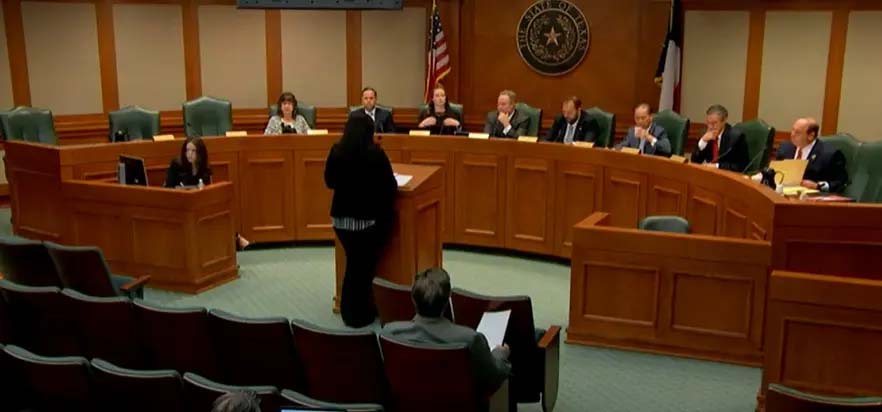From Houston Public Media:
This Friday, more than 770 new state laws go into effect, including one requiring Texas to withdraw from an interstate compact that helps members to keep their voter rolls clean. The Electronic Registration Information Center (ERIC) is the lone entity of its kind shown to reduce the few instances of voter fraud that actually exist. But some of the loudest voices calling for improving election integrity are the same ones who demanded Texas pull out of the organization.
The history of ERIC
ERIC started with seven states in 2012, as a way to help members maintain more accurate voter rolls and reduce the possibility of illegal voting. Executive director Shane Hamiln testified before the Texas House Elections Committee this past April on how the organization works.
“Members securely submit voter registration and motor vehicle department data to us,” Hamlin said. “We are also authorized and certified to use official death data from the Social Security Administration, and we subscribe to National Change of Address data from the United States Postal Service. Using these four data sources, we provide our members with reports that identify inaccurate and out-of-date voter records, deceased voters, individuals who appear…to be eligible but are not registered to vote, and possible cases of illegal voting.”
The organization effectively tracked voters who moved between or within states. “We know from some of the reports from some of the current and former member states that it was very accurate in doing so,” said Daniel Griffith, senior director of policy for the nonprofit Secure Democracy USA. “Another thing that we know ERIC did, because states like Florida and Ohio have told us so, is actually helped identify those very few individuals who actually do go through the process of trying to vote twice in an election.”
Texas joined ERIC in 2020. Christina Adkins, director of the Elections Division at the Texas Secretary of State’s Office, described ERIC’s work in Texas before the House Elections Committee. She testified the same day as Hamlin.
“To date, we have received approximately 4.2 million records from ERIC,” Adkins said. “Of those records, we’ve pushed out about 900,000 matches to the counties so that they can investigate those matches and do what we need to do to determine whether those individuals should be canceled.”

Christina Adkins of the Texas Secretary of State’s Office, testifying before the House Elections Committee, April 20, 2023.
Screenshot / Texas Legislature Online
It was, in other words, exactly what many election integrity advocates said was necessary. At its height, last year, the organization had 31 member states, plus the District of Columbia. And then, one by one, Republican states began pulling out. Texas is now set to become the ninth state to leave ERIC. That’s following the Legislature’s passage of a bill in May, Senate Bill 1070, which bars the Secretary of State’s Office from complying with some of ERIC’s rules.
“We’ve given notice to ERIC that we will be leaving effective October 19,” said Alicia Pierce, a spokesperson for the Texas Secretary of State’s Office.
Why Republican states are leaving ERIC
There are several reasons behind the exodus from ERIC. One factor is the cost. As one of the largest states participating, Texas had some of the highest dues. Those dues were scheduled to increase, even as the number of other states participating in ERIC declined, decreasing its usefulness. Pierce confirmed that Texas’ annual dues in ERIC recently increased from $116,000 to $175,000. “When we have less data from multiple states and it’s costing us more, it just seemed like it was better to make the exit now,” she said.
Another factor was that states objected to several of ERIC’s rules, particularly the rule requiring that member states use the information gathered to identify eligible voters who were not yet registered and to notify them of their eligibility.
“There is a lot of concern among different members within the Texas community, but I think even nationwide, about using taxpayer dollars to pay for voter registration efforts like that, where we’re trying to solicit and promote voter registration,” Adkins said.
Brendan Fischer, deputy executive director of the democracy watchdog group Documented, said that the requirement to find unregistered, eligible voters and encourage them to register has provided fodder for right-wing conspiracy theorists.
“That’s been described as a left-wing voter registration drive,” Fischer said. “It’s been described as an effort to swell the votes for Democrats, as former President Trump has said. It’s not true. Eligible but unregistered voters vote for both Republicans and Democrats. And there’s certainly nothing sinister about trying to encourage more people to participate in our democracy.”
One of the more notorious aspects of such conspiracy theories focuses on false claims that billionaire George Soros funds the organization. Houston Public Media filed a public records request with the Texas Secretary of State’s Office. Virtually every one of the emails to the office regarding ERIC from the first half of the year came from a constituent opposed to the state’s membership, citing left-wing influence over ERIC’s funding. Often, the emails named Soros specifically.
ERIC executive director Shane Hamlin told the House Elections Committee that the organization currently receives all its funding from membership dues.
“Our initial startup cost came from (the) Pew (Research Center), and I have talked with them about where the origins of that funding were,” Hamlin said. “It has been publicized a couple of times there. There are no other funders. If you’re speaking of one individual in particular, one foundation in particular, that was not involved in funding ERIC in the beginning.”
State Representative Dustin Burrows (R-Lubbock) pressed the issue, “So, what are we talking about?”
Hamlin responded, “If you’re talking about funding from the Open Source Society or whatever George Soros’s foundation is, it was not involved in the creation of ERIC.”
EagleAI and SB 1070
The myth persists. One of its most-dedicated proponents is Cleta Mitchell. An attorney and former Republican state lawmaker from Oklahoma, Mitchell gained national notoriety as one of the individuals who sought to help then-President Trump overturn the 2020 Georgia election results. She now heads an organization called the Election Integrity Network.
“Mitchell and her Election Integrity Network played a key role in pressuring Republican-led states to cut ties with ERIC,” Documented’s Brendan Fischer said. “But that left a void. It left a vacuum for how these states are going to go about maintaining accurate voter lists. And enter EagleAI.”
EagleAI NETwork manufactures software that conservative activists use to challenge voter registrations. Fischer’s group unearthed emails from Georgia’s state election board alleging Texas was considering EagleAI as an alternative to membership in ERIC. It also uncovered audio of EagleAI CEO Dr. John “Rick” Richards speaking at a presentation to Mitchell’s Election Integrity Network.
“This is what we did for Texas,” Richards said. “We were invited to speak to the Texas legislators’ staff and to about 400 members of the Texas Federation of Republican Women the first weekend in February.”
The timing is significant. On February 21, State Senator Bryan Hughes (R-Mineola) filed SB 1070, which called for Texas to withdraw from ERIC and either develop a public alternative or use a private system that would cost no more than $100,000.
“Many Texans have been concerned about the security of voter information flowing to this national organization,” Hughes told the Senate during the bill’s second reading in April. “Also, the high costs associated with a program that really may not even lead to significant progress in cleaning the voter rolls.”
Documented’s Brendan Fischer pointed to the $100,000 cost and said that, “roughly seems to fit the profile of EagleAI, which roughly seems to fit the way that EagleAI has been describing and pitching itself to state officials.”
Alicia Pierce said the Texas Secretary of State’s Office isn’t sold on EagleAI as an alternative to ERIC but hasn’t yet ruled it out.
The implications of Texas’ departure from ERIC
All of this is a concern for voting rights groups. Katya Ehresman, voting rights program manager for Common Cause Texas, said its been just four years since the state attempted to purge tens of thousands of people incorrectly identified as noncitizens from the state’s voter rolls. The furor over that effort helped to sink Acting Secretary of State David Whitley’s bid for confirmation in the post. Ehresman noted that Keith Ingram, who served as elections director under Whitley, was appointed by current Secretary of State Jane Nelson to head the effort to come up with Texas’ replacement for ERIC.
“I think that’s something that we’re concerned about, is if these lists matching and list maintenance systems are within that same office, that Texas voters should be paying attention and watchdog organizations like ours are going to be paying attention,” Ehresman said.
Alicia Pierce said voters should not be overly concerned about being removed from the rolls. “They’re not simply removed,” Pierce said. “They receive a notice, and then there’s a waiting period before they are removed. And also, under the National Voting Rights Act, there is a window before federal elections, which is 90 days, when people will not be removed through these wholesale actions, where we’re doing large-scale list maintenance. So those are some things that can help reassure people that they’re not going to be removed in an untimely manner.”
Still, Katya Ehresman said that voters should doublecheck their voting status well in advance of the October deadline for this fall’s elections and the February deadline for the 2024 primaries, in order to make sure they’re registered at their current address.
“I think that Texas leaving ERIC adds a heightened level of vigilance that is needed on the back of everyday voters, which should not be required to participate in their elections but might need to be now,” Ehresman said.













